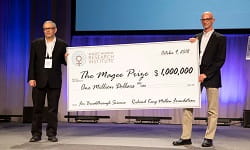
10/10/2018
PITTSBURGH - During the inaugural Magee-Womens Research Summit, Magee-Womens Research Institute (MWRI) awarded the $1 million Magee Prize to an international team of scientists working toward understanding how defects in the placenta during gestation could lead to heart defects in the developing fetus.
 The winner was chosen from three finalists and announced at last night’s Magee Prize Dinner.
The winner was chosen from three finalists and announced at last night’s Magee Prize Dinner.
“I want to pinch myself,” said Yaacov Barak, Ph.D., associate professor of obstetrics, gynecology and reproductive sciences at the University of Pittsburgh and winner of the inaugural Magee Prize. “I have been working on this project and idea for 20 years. It is gratifying to know that persistence pays and yesterday’s wild ideas may become today’s reality.”
Barak noticed two decades ago that mouse embryos with a particular mutated gene – expressed only in the placenta – suffered fatal defects in both the placenta and the heart. To his surprise, fixing the gene just in the placenta corrected the heart defect.
Barak largely shelved the project until recently, when the field started to take notice of a similar trend among human babies. Those with a congenital heart defect were more likely to have had a defective placenta during gestation. This finding is significant because heart defects occur in approximately one in 150 live births, but in most cases, what causes the heart to form improperly is not known. Barak’s previous work led him to suspect the placenta.
To investigate this theory, Barak has assembled what he refers to as a “dream team,” including placenta expert Myriam Hemberger, Ph.D., of the University of Calgary, and heart expert Henry Sucov, Ph.D., of the University of Southern California. The team plans to develop a diverse collection of mouse models, which they will use to both solidify the placenta-heart connection and analyze its underpinnings. That information may usher in earlier detection, and potentially, prevention and treatment strategies.
The Magee prize is funded by the Richard King Mellon Foundation.
Click image to download high resolution version. Photo credit: Gary Yon.
















